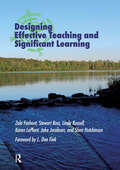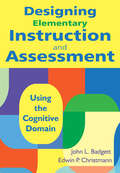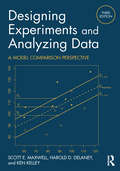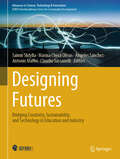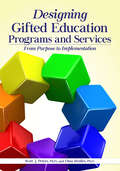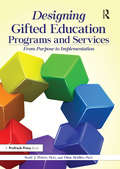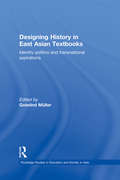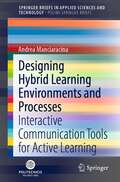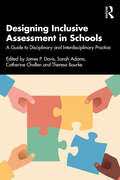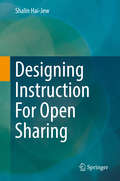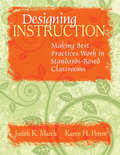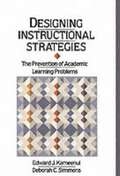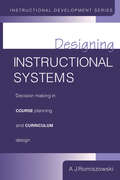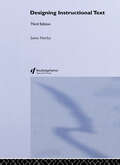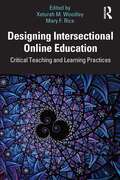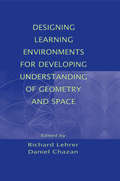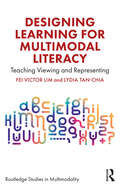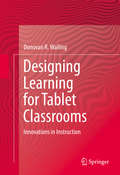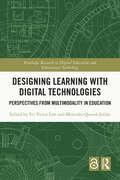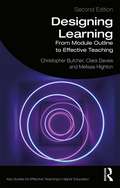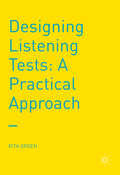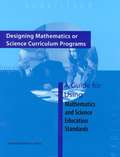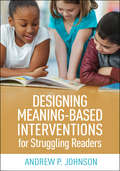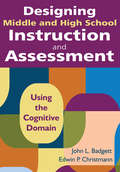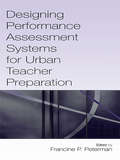- Table View
- List View
Designing Effective Teaching and Significant Learning
by Stewart Ross Jake Jacobson Zala Fashant Linda Russell Karen LaPlantDesigning courses to deliver effective teaching and significant learning is the best way to set students up for success, and this book guides readers through the process. The authors have worked with faculty world-wide, and share the stories of how faculty have transformed courses from theory to practice. They start with Dee Fink’s foundation of integrating course design. Then they provide additional design concepts to expand the course blueprint to implement plans for communication, accessibility, technology integration, as well as the assessment of course design as it fits into the assessment of programs and institutions, and how faculty can use what they learn to meet their professional goals.
Designing Elementary Instruction and Assessment: Using the Cognitive Domain
by John L. Badgett Edwin P. ChristmannA practical guide for creating standards-based objectives and assessments aligned with Bloom’s Taxonomy! This user-friendly resource gives teachers clear, step-by-step guidelines for writing measurable objectives and developing appropriate formative and summative assessments to guide instruction in the elementary classroom. Providing detailed examples for all levels of Bloom’s Taxonomy, the authors cover unit and daily instructional objectives based on state and national content standards as well as all the major forms of assessment. Teachers discover how to: Deconstruct the standards and write concrete objectives Create true-false, fill-in-the-blank, matching, and multiple choice exercises Write short-answer questions and essay items Use performance-based assessments and portfolios
Designing Experiments and Analyzing Data: A Model Comparison Perspective, Third Edition (The\inquiry And Pedagogy Across Diverse Contexts Ser.)
by Scott E. Maxwell Harold D. Delaney Ken KelleyDesigning Experiments and Analyzing Data: A Model Comparison Perspective (3rd edition) offers an integrative conceptual framework for understanding experimental design and data analysis. Maxwell, Delaney, and Kelley first apply fundamental principles to simple experimental designs followed by an application of the same principles to more complicated designs. Their integrative conceptual framework better prepares readers to understand the logic behind a general strategy of data analysis that is appropriate for a wide variety of designs, which allows for the introduction of more complex topics that are generally omitted from other books. Numerous pedagogical features further facilitate understanding: examples of published research demonstrate the applicability of each chapter’s content; flowcharts assist in choosing the most appropriate procedure; end-of-chapter lists of important formulas highlight key ideas and assist readers in locating the initial presentation of equations; useful programming code and tips are provided throughout the book and in associated resources available online, and extensive sets of exercises help develop a deeper understanding of the subject. Detailed solutions for some of the exercises and realistic data sets are included on the website (DesigningExperiments.com). The pedagogical approach used throughout the book enables readers to gain an overview of experimental design, from conceptualization of the research question to analysis of the data. The book and its companion website with web apps, tutorials, and detailed code are ideal for students and researchers seeking the optimal way to design their studies and analyze the resulting data.
Designing Futures: Bridging Creativity, Sustainability, and Technology in Education and Industry (Advances in Science, Technology & Innovation)
by Angeles Sánchez Marina Checa Olivas Saimir Shtylla Antonio Maffei Claudio SassanelliThis book is a compelling exploration into the integration of sustainability with creativity and technology. It offers a cohesive journey from theoretical insights into practical applications across creative disciplines, education, and industries. This book serves as a crucial guide for those looking to navigate the challenges of modern sustainability through innovative solutions. By showcasing examples from 3D printing in education to sustainable practices in creative industries and the preservation of cultural heritage through digital innovation, it highlights the transformative power of creativity in fostering a sustainable future. Aimed at academics, professionals, and students, this book is an invitation to engage, innovate, and contribute to the sustainability discourse in the creative sectors.
Designing Gifted Education Programs and Services: From Purpose to Implementation
by Dina Brulles Scott PetersThis book is intended to support educators in the design and implementation of comprehensive gifted education plans. From planning to actual implementation, this book takes the reader from goals and purpose to assessing student needs and program design. The authors begin with a broad overview of best practices in programming and services, highlighting connections to student needs, programming standards, and state laws. Their recommendations include philosophical, cultural, and practical considerations and data-based decision making. In this book, Peters and Brulles guide the reader through the process of determining the most optimal programming methods for schools to take based on their individual needs and circumstances. With this book, schools will be able to design and develop programs and/or services that lay the foundation necessary to ensure all students are appropriately challenged.
Designing Gifted Education Programs and Services: From Purpose to Implementation
by Scott J. Peters Dina BrullesThis book is intended to support educators in the design and implementation of comprehensive gifted education plans. From planning to actual implementation, this book takes the reader from goals and purpose to assessing student needs and program design. The authors begin with a broad overview of best practices in programming and services, highlighting connections to student needs, programming standards, and state laws. Their recommendations include philosophical, cultural, and practical considerations and data-based decision making. In this book, Peters and Brulles guide the reader through the process of determining the most optimal programming methods for schools to take based on their individual needs and circumstances. With this book, schools will be able to design and develop programs and/or services that lay the foundation necessary to ensure all students are appropriately challenged.
Designing History in East Asian Textbooks: Identity Politics and Transnational Aspirations (Routledge Studies in Education and Society in Asia)
by Gotelind MüllerThis book analyses the efforts throughout East Asia to deploy education for purposes of political socialization, and in particular in order to shape notions of identity. The chapters also examine the trend of ‘common textbook initiatives’, which have recently emerged in East Asia with the aim of helping to defuse tensions arguably fuelled by existing practices of mutual (mis)representation. These are analysed in relation to the East Asian political context, and compared with previous and ongoing endeavours in other parts of the world, particularly Europe, which have been keenly observed by East Asian practitioners. Written by a group of international education experts, chapters discuss the enduring focus on the role of curricula in inculcating homogenous visions of the national self, and indeed homogenized visions of significant 'others'. Including contributions from scholars and curriculum developers involved personally in the writing of national and multi-national history textbooks this book will be of interest to students and scholars of Asian education, Asian history and comparative education studies. Gotelind Müller is Professor of Chinese Studies, University of Heidelberg, Germany
Designing Hybrid Learning Environments and Processes: Interactive Communication Tools for Active Learning (SpringerBriefs in Applied Sciences and Technology)
by Andrea ManciaracinaThis volume explores the relationship between space, pedagogy, and technology, with a particular focus on the latter since it is the connecting element that relates to all analysed contexts. The learning experience is investigated and supported by a review of works by referenced authors, underlining the active learning approach that can create better alliances among users and redefine the role of the teacher as a director and a facilitator. The volume offers a conceptualisation of learning technologies for innovative learning environments by creating a grid of technologies for active approaches. Then, it reflects on the comparison between the on-site and online learning environments, focusing on a stressful context. It offers and discusses an instructional design tool that supports teachers in designing hybrid learning contexts. Practitioners who wish to reframe technology in teaching using both digital and physical resources will find it very inspiring.
Designing Inclusive Assessment in Schools: A Guide to Disciplinary and Interdisciplinary Practice
by James P. Davis Sarah Adams Theresa Bourke Catherine ChallenWritten by teachers and teacher educators, this book presents practice-focused ideas and provocative questions to help teachers plan for inclusive curriculum and assessment within key learning areas in school education.Providing content on specific disciplines including geography, history, mathematics, science, English, and the Arts, this book supports teachers with hands-on examples for creating inclusive assessment practices in schools. There are additional sections on interdisciplinary perspectives delivering practical strategies for assessing students who use English as an additional language, being inclusive in relation to gender and sexual diversity, using a variety of technologies to promote inclusivity, and applying inclusive assessment in rural, regional, and remote contexts. Each chapter is designed around problems encountered by teachers, practical responses, and recommendations for practice. The authors address Australian Indigenous perspectives, gender and diversity, rural and remote school systems, and translanguaging for multicultural contexts.Engaging and easy to read, this book is essential reading for pre- and in-service teachers seeking to make an impactful contribution to inclusive education in their classrooms.
Designing Instruction For Open Sharing
by Shalin Hai-JewThis textbook considers and addresses the design of online learning objects, electronic textbooks, short courses, long courses, MOOC courses, and other types of contents for open sharing. It also considers the design of online mediated communities to enhance such learning. The “openness” may be open-access, and/or it may even be open-source. The learning may range from self-directed and automated to AI robot-led to instructor-led. The main concept of this work is that design learning for open sharing, requires different considerations than when designing for closed and proprietary contexts. Open sharing of learning contents requires a different sense of laws (intellectual property, learner privacy, pedagogical strategies, technologies, media, and others). It requires different considerations of learner diversity and inclusion. It requires geographical, cultural, and linguistic considerations that are not as present in more localized designs. The open sharing aspect also has effects on learner performance tracking (assessments) and learner feedback. This textbook targets students, both undergraduate and graduate in computer science, education and other related fields. Also, professionals in this field managing online systems would find this book helpful.
Designing Instruction: Making Best Practices Work in Standards-Based Classrooms
by Judith K. March Karen H. PetersDemonstrates how to develop a standards-based curriculum, deliver and assess instruction with research-based best practices, and implement capacity-building processes that support a school's daily operation.
Designing Instructional Strategies: The Prevention of Academic Learnig Problem
by Edward J. Kameenui Deborah C. SimmonsDesigning Instructional Strategies: The Prevention of Academic Learning Problems is about designing and delivering instruction to students with academic learning problems. These students are identified as learning disabled, mildly handicapped, or emotionally disturbed who receive services in special education or general education settings.
Designing Instructional Systems: Decision Making in Course Planning and Curriculum Design
by Romiszowski, A. J.First Published in 1984. Routledge is an imprint of Taylor & Francis, an informa company.
Designing Instructional Text
by Hartley, JamesThis is a practical guide for teachers and trainers who are responsible for designing and writing instructional material. Focusing on layout and the visual presentation of text, the author of this work uses "before and after" formats to illustrate the importance of clarity, structure and emphasis.
Designing Intersectional Online Education: Critical Teaching and Learning Practices
by Xeturah M. WoodleyDesigning Intersectional Online Education provides expansive yet accessible examples and discussion about the intentional creation of online teaching and learning experiences that critically center identity, social systems, and other important ideas in design and pedagogy. Instructors are increasingly tasked with designing their own online courses, curricula, and activities but lack information to support their attention to the ever-shifting, overlapping contexts and constructs that inform students’ positions within knowledge and schooling. This book infuses today’s technology-enhanced education environments with practices derived from critical race theory, culturally responsive pedagogy, disability studies, feminist/womanist studies, queer theory, and other essential foundations for humanized and socially just education. Faculty, scholars, technologists, and other experts across higher education, K-12, and teacher training offer fresh, robust insights into how actively engaging with intersectionality can inspire designs for online teaching and learning that are inclusive, intergenerational, anti-oppressive, and emancipatory.
Designing Learning Environments for Developing Understanding of Geometry and Space (Studies in Mathematical Thinking and Learning Series)
by Daniel Chazan Richard LehrerThis volume reflects an appreciation of the interactive roles of subject matter, teacher, student, and technologies in designing classrooms that promote understanding of geometry and space. Although these elements of geometry education are mutually constituted, the book is organized to highlight, first, the editors' vision of a general geometry education; second, the development of student thinking in everyday and classroom contexts; and third, the role of technologies.Rather than looking to high school geometry as the locus--and all too often, the apex--of geometric reasoning, the contributors to this volume suggest that reasoning about space can and should be successfully integrated with other forms of mathematics, starting at the elementary level and continuing through high school. Reintegrating spatial reasoning into the mathematical mainstream--indeed, placing it at the core of K-12 mathematics environments that promote learning with understanding--will mean increased attention to problems in modeling, structure, and design and reinvigoration of traditional topics such as measure, dimension, and form. Further, the editors' position is that the teaching of geometry and spatial visualization in school should not be compressed into a characterization of Greek geometry, but should include attention to contributions to the mathematics of space that developed subsequent to those of the Greeks.This volume is essential reading for those involved in mathematics education at all levels, including university faculty, researchers, and graduate students.
Designing Learning for Multimodal Literacy: Teaching Viewing and Representing (Routledge Studies in Multimodality)
by Fei Victor Lim Lydia Tan-ChiaDesigning Learning for Multimodal Literacy addresses the need to design learning for multimodal literacy in a world that is increasingly saturated with print and digital media. In the current age, communication and interactions on social media are seldom made with language alone but are often accompanied with emojis, images, and videos, making meanings multimodally. Young people, including children, are also increasingly active in making videos of themselves, their ideas, and their experiences as part of their out-of-school literacy activities. In particular, for language teachers, the present shifts in our world require that teachers re-examine what they teach and how they can meaningfully and effectively teach the students in their classes today. At 8 years old, Alden created his own rap music video and shared it with the world. He wrote his own lyrics and set it against the music he remixed and meshed from a music download site. Alden is in your classroom today. As his teacher, what would you teach him? How would you engage him? Alden, and children like him, is the inspiration for why the authors have written this book. The changing times and changing learners place a demand on educators to continually reflect on what and how teachers are teaching their students – to ensure that learning in school remains relevant, relatable, and prepares them for the world of the future. Lim’s book outlines how teachers can design learning for multimodal literacy. It is a result of a collaboration between an educational researcher and a curriculum developer, and offers practical resources for practitioners but also design principles and considerations based on practice with a range of students to inform and inspire academics and postgraduate students. It is poised to contribute to the global conversation and interest on how educators can reflect on the zeitgeist of the digital age and design learning for multimodal literacy.
Designing Learning for Tablet Classrooms
by Donovan R. WallingThe versatile, cost-effective technology of the tablet computer has proved to be a good fit with the learning capabilities of today's students. Not surprisingly, in more and more classrooms, the tablet has replaced not only traditional print materials but the desktop computer and the laptop as well. Designing Instruction for Tablet Classrooms makes sense of this transition, clearly showing not just how and why tablet-based learning works, but how it is likely to evolve. Written for the non-technical reader, it balances elegant theoretical background with practical applications suitable to learning environments from kindergarten through college. A wealth of specialized topics ranges from course management and troubleshooting to creating and customizing etextbooks, from tablet use in early and remedial reading to the pros and cons of virtual field trips. And for maximum usefulness, early chapters are organized to spotlight core skills needed to negotiate the new design frontier, including: Framing the learning design approach. Analyzing the learning environment. Designing learning that capitalizes on tablet technology. Developing activities that match learning needs. Implementing the learning design. Conducting evaluations before, during, and after. This is proactive reading befitting a future of exciting developments in educational technology. For researchers and practitioners in this and allied fields, Designing Instruction for Tablet Classrooms offers limitless opportunities to think outside the box.
Designing Learning with Digital Technologies: Perspectives from Multimodality in Education (Routledge Research in Digital Education and Educational Technology)
by Fei Victor Lim Mercedes Querol-JuliánThis book offers a multimodal perspective on how to design meaningful learning experiences with digital technologies.Digital education is of increasing importance in today’s digital society and the editors bring together international thought-leaders and well-established academics across geographical regions to explore the topic. The book addresses the need to design learning with digital technologies, especially in a post-pandemic environment where blended learning has become ubiquitous. The book is organised around five themes: designing learning, digital learning designs, digital learning with embodied teaching, digital learning interactions, and digital multimodal literacies. The chapters focus on digital technologies as multimodal semiotic resources and the educational implication of each theme is drawn out from illustrative cases across contexts of learning.Essential reading for researchers and postgraduate students, this book offers state-of-the-art thinking on how educators can design new learning experiences for students through the meaningful and effective use of digital technologies.Chapter 1 of this book is freely available as a downloadable Open Access PDF at http://www.taylorfrancis.com under a Creative Commons Attribution-Non Commercial-No Derivatives (CC-BY-NC-ND) 4.0 license.
Designing Learning: From Module Outline to Effective Teaching (Key Guides for Effective Teaching in Higher Education)
by Christopher Butcher Clara Davies Melissa HightonBridging the gap between theory and practice, this fully updated new edition of Designing Learning offers accessible guidance to help those new to teaching in higher education to design and develop a course. With new considerations to the higher education context, this book uses current educational research to support staff in their endeavour to design and develop modules and degree courses of the highest quality. Offering guidance on every stage, from planning to preparing materials and resources, with a focus on the promotion of learning, this book considers: Course design models and shapes and their impact on learning How the external influences of learning and teaching are translated by different institutions How to match the content of a course to its outcomes Frameworks to enable communication between staff and students about expectations and standards Taking into account the diverse student population when designing a course The place of VLE, communication tools and systems for monitoring students‘ engagement The importance of linking all aspects of the taught curriculum and wider co-/extra-curricular activities to support learning Ways to evaluate and enhance a course and to develop oneself as a teaching professional in HE. Providing advice, illustrative examples and case studies, Designing Learning is a comprehensive guide to designing a high quality course. This book is a must-read for any academic looking to create or update their course or module.
Designing Listening Tests
by Rita GreenThis book examines the crucial role that sound file selection plays in assessing listening ability and introduces the reader to the procedure of textmapping, which explores how to exploit a sound file. The book discusses the role of the task identifier, the task instructions and the example, and analyses the strengths and weaknesses of different test methods. Guidelines for developing listening items, and procedures that can be used in peer review and task revision are also provided. A range of sample listening tasks illustrates the benefits of following the test development approach described in the book. Developing Listening Tests also provides insights into the advantages that field trials, statistical analyses and standard setting can offer the language test developer in determining how well their tasks work. This practical book will be of interest to researchers, language testers, testing commissions, and teachers engaged in assessing listening performance around the world.
Designing Mathematics or Science Curriculum Programs: A Guide for Using Mathematics and Science Education Standards
by Committee on Science Education K-12 the Mathematical Sciences Education BoardWith the publication of the National Science Education Standards and the National Council of Teachers of Mathematics' Curriculum and Evaluation Standards for School Mathematics, a clear set of goals and guidelines for achieving literacy in mathematics and science was established. Designing Mathematics or Science Curriculum Programs has been developed to help state- and district-level education leaders create coherent, multi-year curriculum programs that provide students with opportunities to learn both mathematics and science in a connected and cumulative way throughout their schooling.Researchers have confirmed that as U.S. students move through the grade levels, they slip further and further behind students of other nations in mathematics and science achievement. Experts now believe that U.S. student performance is hindered by the lack of coherence in the mathematics and science curricula in many American schools. By structuring curriculum programs that capitalize on what students have already learned, the new concepts and processes that they can learn will be richer, more complex, and at a higher level. Designing Mathematics or Science Curriculum Programs outlines: Components of effective mathematics and science programs. Criteria by which these components can be judged. A process for developing curriculum that is structured, focused, and coherent. Perhaps most important, this book emphasizes the need for designing curricula across the entire 13-year span that our children spend in elementary and secondary school as a way to improve the quality of education. Ultimately, it will help state and district educators use national and state standards to design or re-build mathematics and science curriculum programs that develop new ideas and skills based on earlier ones--from lesson to lesson, unit to unit, year to year.Anyone responsible for designing or influencing mathematics or science curriculum programs will find this guide valuable.
Designing Meaning-Based Interventions for Struggling Readers
by Andrew P. JohnsonThis highly practical book helps K–8 teachers implement effective reading interventions that support meaningful comprehension and engage students with interesting, age-appropriate texts. Andrew P. Johnson presents a range of strategies for addressing difficulties in the core areas of word identification, fluency, and comprehension. Packed with illustrative figures, the book provides guidance and tools for assessing reading problems, combining and adapting interventions for particular students, planning writing activities to enhance reading, aligning efforts within a response-to-intervention framework, and designing individualized education programs. Informed by current research, Johnson candidly targets "educational malpractice&” and helps readers puzzle through the controversies surrounding dyslexia diagnoses and special education decision making.
Designing Middle and High School Instruction and Assessment: Using the Cognitive Domain
by John L. Badgett Edwin P. ChristmannCreate objectives and assessments that tap into all levels of Bloom’s Taxonomy! This practical book provides middle and high school teachers with explicit guidance on developing specific objectives and appropriate formative and summative assessments. After presenting an easy-to-follow model for designing objectives based on state and national content standards, the authors cover the major forms of assessment and provide detailed examples for all levels of Bloom’s Taxonomy. Teachers will learn how to: Unwrap state and national standards Write measurable objectives for unit and daily lesson plans Develop assessments in the content areas
Designing Performance Assessment Systems for Urban Teacher Preparation
by Francine P. PetermanDesigning Performance Assessment Systems for Urban Teacher Preparation presents an argument for, and invites, critical examination of teacher preparation and assessment practices--in light of both the complexity and demands of urban settings and the theories of learning and learning to teach that guide teacher education practices. This dynamic approach distinguishes the authors' stance on urban teacher assessment as one that can help address social justice issues related to gender, race, socioeconomic class, and other differences, and at the same time promote the professional development of all educators engaged in the process of learning to teach. The contextually bound, sociocultural stance that informs this book promises greater teacher and student achievement.Culminating six years of vital dialogue and focused, local activity among teachers and teacher educators from institutions in the Urban Network to Improve Teacher Education, Designing Performance Assessment Systems for Urban Teacher Preparation presents:*the historical context that was examined for this work, a theoretical framework to undergrad teacher preparation assessment, and design principles to guide the development of assessment systems;*four case studies of participants' struggles and successes in designing and implementing these systems; and*a discussion of the importance of context and current trends in assessment practices in urban teaching.This volume is particularly relevant for university and school-based teacher educators who help prepare teachers to work in urban schools, and for personnel in state departments of education and other agencies who are responsible for certification and beginning teacher support. While the focus is on preparing teachers for urban settings, the theoretical and practical foundations and the case studies have broad implications and provide useful insights for anyone involved in developing and using performance assessment systems--teacher educators, university and school administrators, classroom teachers, and educational researchers.
